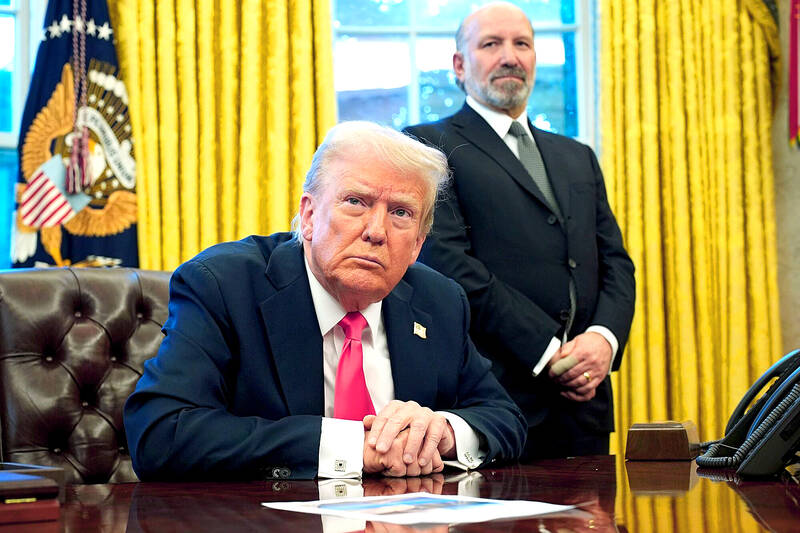US President Donald Trump has signed an executive order directing the US Department of Commerce to examine possible copper tariffs, the latest in a string of measures aimed at imposing sector-specific levies that could reshape global supply chains.
Trump said the order would have a “big impact” as he signed it in the Oval Office, joined by US Secretary of Commerce Howard Lutnick.
Senior administration officials earlier on Tuesday cast the step as necessary to address what they said was a national security issue. They argued that dumping and overcapacity in world markets had impacted domestic US copper production, leaving weapons systems and other critical products dependent on imports.

Photo: Abaca/Bloomberg
The officials, briefing reporters on condition of anonymity, said it was premature to discuss a potential rate for the tariffs.
Copper is a critical material for modern economies because of its widespread use in the wiring that delivers electricity to homes and factories. Many analysts forecast higher prices this decade, as supply fails to keep pace with demand. As with other metals, China’s grip is particularly strong when it comes to processing — the country accounted for about 44 percent of the world’s refined copper last year, according to the US Geological Survey.
The investigation would be carried out under Section 232 of the Trade Expansion Act, which gives the US president broad authority to impose trade restrictions on domestic security grounds.
Trump is also employing that authority to impose 25 percent tariffs on two other industrial metals — steel and aluminum — with those levies slated to take effect next month.
Lutnick said in a statement that the action would also probe products that include copper, and said the administration aimed to rejuvenate the domestic copper industry.
“Like our steel and aluminum industries, our great American copper industry has been decimated by global actors attacking our domestic production,” Lutnick said. “Tariffs can help build back our copper industry, if necessary, and strengthen our national defense.”
Peter Navarro, a Trump trade adviser, singled out China, saying it had “long used industrial overcapacity and dumping as an economic weapon to dominate global markets, systematically undercutting competitors and driving rival industries out of business.”
The US consumed about 1.6 million tonnes of refined copper last year, according to the US Geological Survey.
While the US has significant mines, producing about 850,000 tonnes of primary copper last year, it still relies on imports from key trade allies to fill the need.
Chile is the largest import source, accounting for 38 percent of total import volumes, followed by Canada and Mexico at 28 percent and 8 percent respectively.

In Italy’s storied gold-making hubs, jewelers are reworking their designs to trim gold content as they race to blunt the effect of record prices and appeal to shoppers watching their budgets. Gold prices hit a record high on Thursday, surging near US$5,600 an ounce, more than double a year ago as geopolitical concerns and jitters over trade pushed investors toward the safe-haven asset. The rally is putting undue pressure on small artisans as they face mounting demands from customers, including international brands, to produce cheaper items, from signature pieces to wedding rings, according to interviews with four independent jewelers in Italy’s main

Japanese Prime Minister Sanae Takaichi has talked up the benefits of a weaker yen in a campaign speech, adopting a tone at odds with her finance ministry, which has refused to rule out any options to counter excessive foreign exchange volatility. Takaichi later softened her stance, saying she did not have a preference for the yen’s direction. “People say the weak yen is bad right now, but for export industries, it’s a major opportunity,” Takaichi said on Saturday at a rally for Liberal Democratic Party candidate Daishiro Yamagiwa in Kanagawa Prefecture ahead of a snap election on Sunday. “Whether it’s selling food or

CONCERNS: Tech companies investing in AI businesses that purchase their products have raised questions among investors that they are artificially propping up demand Nvidia Corp chief executive officer Jensen Huang (黃仁勳) on Saturday said that the company would be participating in OpenAI’s latest funding round, describing it as potentially “the largest investment we’ve ever made.” “We will invest a great deal of money,” Huang told reporters while visiting Taipei. “I believe in OpenAI. The work that they do is incredible. They’re one of the most consequential companies of our time.” Huang did not say exactly how much Nvidia might contribute, but described the investment as “huge.” “Let Sam announce how much he’s going to raise — it’s for him to decide,” Huang said, referring to OpenAI

The global server market is expected to grow 12.8 percent annually this year, with artificial intelligence (AI) servers projected to account for 16.5 percent, driven by continued investment in AI infrastructure by major cloud service providers (CSPs), market researcher TrendForce Corp (集邦科技) said yesterday. Global AI server shipments this year are expected to increase 28 percent year-on-year to more than 2.7 million units, driven by sustained demand from CSPs and government sovereign cloud projects, TrendForce analyst Frank Kung (龔明德) told the Taipei Times. Demand for GPU-based AI servers, including Nvidia Corp’s GB and Vera Rubin rack systems, is expected to remain high,